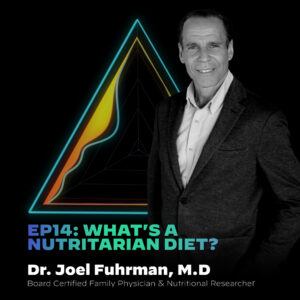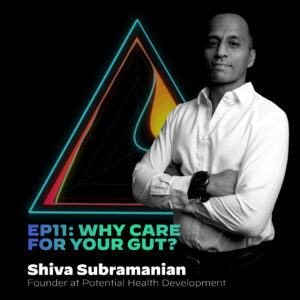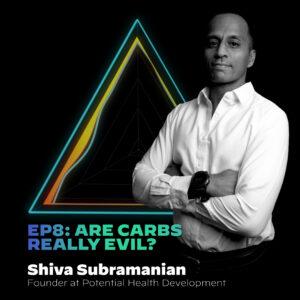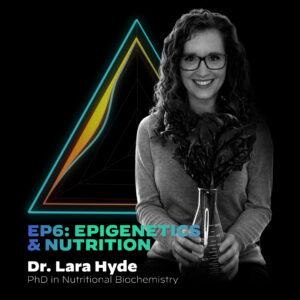Introduction Of Podcast
With evolution, the dietary trends of humans have also evolved. There is a reason we put on weight if we don’t exercise and there’s also a reason why that one person you know, no matter what they eat, never puts on weight. Let’s find out why. It’s time for us to start rethinking nutrition.
Timestamps
- (00:00 – 01:03) – Introduction
- (01:04 – 05:01) – Why is Food Complex?
- (05:03 – 14:00) – Aspects of Food Supply Chain
- (14:44 – 19:10) – Evolution of Food Consumption
Key Takeaways – Transcripts
Intro (Mohit): Food from the way we look at it. And probably like when you think about general health and fitness, probably is one of the most complicated things out there. I heard, sometime back, Pavel Tsatsouline talk about nutrition, and he said, “I don’t touch nutrition because that’s like the most complicated thing. I just eat whatever and I compensate it with my activity.” Because probably nutrition is one of the most complicated things out there. And it’s probably like the easiest thing that can happen is people are categorizing food as good and bad, sometimes healthy foods, unhealthy foods, sometimes different types of extreme diets driven by a specific formula or a math, right?
Question (Mohit): So how much role does food have to play specifically in metabolic health?
And the other question, which is like, which is not straightforward, but why is it so complex?
Answer (Shiva): I don’t think it’s complex, Mohit. I think it’s what we’ve done to the industry itself. Food is a trillion-dollar industry. If you do not label it, you do not come up with these concepts. How can we sell it? So, it becomes beyond just about the food, right? Is there a marketability to it, right? Is there other things around it? I think food is still simple. Food is very simple, right? I mean, let’s look at it from the most basic, fundamental unit of it is just that it’s energy that you need to break down to be able to absorb because it’s not usable form as far as you’re concerned until you put it into your system. Technically, we should be agnostic about food. If your health was so optimal, you should be able to consume anything and be able to function. Our problem is not in the food. Look, we’re looking at this in isolation, aren’t we? We’re not looking at it into the complexity of sleep, what movement you’ve done during the day, your age, what stage of life or stress level that
you’re in, what season it is. But you don’t have to think about all this because that’s what your body was supposed to do anyway. But we’re doing so many things that is so far away from our natural response every day that this is just becoming a consequence of that, right? If you think about it, it’s not the food that’s a problem. Even with processed food, there was a reason why they processed food. It was the wars. We had none, right? So, you needed to process food because you need to store it. You can’t say that processed food is bad. It was there for a reason at a time that it was created. Now, how we’ve utilized it after that is a choice again, right? So even with food, be careful about these judgments that you make. And I think that’s what makes food interesting. It is quite simple. The question we should ask is have I made the vessel able to consume whatever I want to? Maybe we should switch the thought process because right now we’re thinking food is bad, I’m going to change the food. The real question we should ask is people have been consuming this for years. So why am I not being able to consume this? which is a question that you invert. You’re saying, okay, what about my biochemistry? What about my physiology? Can I change to be able to consume anything? Suddenly it’s a different kind of freedom that you’re offered, right? So, this is what you meant about metabolic health. Metabolic health is about performance and efficiency of the self. It’s got nothing to do with metabolic syndrome, for example. It’s a breakdown of the system. If you can break down a system, that’s one end of the bell curve. You can also make it highly efficient, on the other hand, right? So, if you begin to observe it like this, it becomes a whole different ball game in terms of metabolism. And I think that maybe that’s a better answer, because what I’m trying to say is if you improve your microbiome in your gut, a person who doesn’t have the lactose persistence gene can still digest milk. Why? Because the bacteria, which is a symbiotic, has a symbiotic relationship with us, has not taken that burden. But are we doing enough to be able to do that? So, it’s a very simple action, isn’t it? It’s that fermented foods. But how much fermented foods do we have today? We don’t have fermented foods because we have a refrigerator. Why did we ferment food? We fermented food so that it would stay, right? Whether it was in the west, they had beef jerky. Over here, we pickled vegetables, we have pickles. You have a whole range of salted foods that we have in all our cultures, right?
(Mohit): Yeah, fermented dairy.
(Shiva): So, my point is, if you think about it like that, then really, it’s a different mindset, isn’t it? But that’s what I meant. I mean, what is the microbiome an excuse to test the microbiome is an excuse to test to see what you’re missing. Because we’ve lived symbiotically with fermented food for years before the refrigerator came in, right? Yeah.
Question (Mohit): But simplifying this a little bit. I think. So, you’re saying the first aspect that you mentioned is that optimizing the vessel for having more food flexibility. So, the vessel itself is being under optimized in the blame, obviously, it actually comes to food. Exactly. But then the other aspect of this is optimizing the food, right? There will be individual aspects of food that might be suffering because our food supply chain has not evolved in the healthiest way or in the most sustainable way possible. Absolutely. What are some of the aspects, like processed food is one of them the way we use processed food. But then are there other aspects ranging from soil and everything else?
Answer (Shiva): 100%, because we’re using so many pesticides and fertilizers and that is already depleted a lot of the nutrition in the soil coming in is already compromised. I would say. Recently they found out that there’s something in the soil with the microbiome that works on something called the Shikimate pathway that actually does the forest of protein formation in the food. Now, if you don’t have the Shikimate pathway working, then you’re missing some essential amino acids, which would normally be there because of the microbiome, right? And if that’s missing there, it’s also missing in your gut because the same fertilizers, herbicides, pesticides, whatever you want to call them, could also be doing the same thing in your gut.
Question (Mohit): So, coffee from a different field basically will react with the body differently?
Answer (Shiva): There’s this guy called Dr. Zach Bush, who recently found that the carbon molecules in a very fertile old soil could directly communicate to the microbiome in your gut and change its function. Imagine just a carbon molecule. Why? Because the carbon molecule is an old version of because it’s been constantly recycled. There’s actually a signaling mechanism between the microbiota of the ground. And he actually took this and actually made it into a probiotic kind of drink with the carbon in it. I’m just saying, if you look at the kind of research and stuff that’s out there, but all you actually have to do is farm in old lands, right? I mean, they went to a forest, got the kind of carbon molecules and distilled it, and made this probiotic. But to change signaling, there is a connection with us into the soil, into the Earth and the ground, right? And when we find these interrelationships, how significant are they? Look, that’s just a small part of the equation. Then you come to the processed food. We’ve taken a lot of fiber out of our foods, and the more fiber we have, obviously, it’s going to do a lot of good for our gut, right? Especially with motility, with the kind of prebiotic. So, what we develop in our gut is how we speak to the gut brain access. Now, people know of that’s existing. It’s how we make serotonin. 80% of the serotonin is made in your gut. Now, if you look at it, unless we are able to put all this stuff back in, then you’re going to just be functional again. Now, processed food is because of the speed of processing. You’re going to take out a lot of the fiber or maybe a lot of the micronutrients out of the food to make it more palatable. The problem with processed food may not be the processing. It may be what they’re doing in terms of how you process the food. So, let me give you an example, right? High sugar, fructose, glutamate. Mhd. Like those kind of things that all comes, as I was telling you, from our biological past, right? So the minute you’re going to look at that stuff, Your brain is going to light up. Fructose actually helped us store fat because it goes into the uric acid cycle and actually helps us store fat. It was a fat storing mechanism. All animals still do it, right? They get highly diabetic. Basically, they get diabetic to store a whole amount of fat for the lean period. What are we doing now? No wonder it’s palatable, because even for us fructose the minute it touches us. Now, obviously, people understand that chemistry and what’s been created is a high fructose-based food. It’s got sugars and fructose. Now, obviously it’s palatable because that’s what we designed to do right before we had to go hunting and looking for this. Now it’s freely available in a large amount of quantity, right? So is that bad or good? No. I mean, what are we doing to manage that? So now comes to the next point of exercise, right? Not all exercises are created equal. If you have a high carb food, your lactate threshold, your lactate levels actually increase. But also, there are some other interesting things that happen when we have, like a high carb diet. What kind of exercise will you do? In recent research, they said that this zone two training was very good for the mitochondria because what it then does is it consumes all of this glucose, and you can channel it through. But here’s the problem with zone two. How many people know what their zone two is? It’s again, about that precision, right? Your zone two and mine two can vary. What we’ll do is probably go look at it as 180 minus your age, and that should be zone two. Sometimes you’re 20. Yeah, but it doesn’t work like that unless you do a VO two tests and you know what your ranges are and where you’re breaking down what and what your zone two is. Then you’re like, I have to stay there for 30 minutes, and then you have the endurance to stay there for 30 minutes, and then you can get the mitochondria on, right? We jumped because you see the end of something, and then we jumped to that, right. Without interrelating the consequences of those things. Now, if you are doing a zone two training and you’ve had the high fructose or sugar-based thing, it’s immediately consumed into some movement, then maybe the consequences of that are not so bad because the mitochondria have actually
fed off it and its energy right. Now, processed foods. Let’s look at you used to cycle a lot, right? Didn’t you have any of those packets of Dextrose?
(Mohit): Many.
(Shiva): Think about that. That’s also processed food, but it had a specific use case during that time, and the same as marathon runners. Dextrose, who’s to say? That’s my point. We have to be careful. They are there for a reason. In the old days, the guys may have run one marathon or two marathon distances a year, and those are only the long-distance runners. Nobody else did that, right? The Tarahumura, which is the whole bond to run thing. Or you’re looking at people in Africa who are used to doing running long distance had purpose to run that, but they didn’t do it like every month. But a modern-day guy who’s doing marathons, maybe doing it quite a bit more and will need the recovery, right? He will need that. So, this processed food that we think is bad in a certain situation is maybe highly applicable in another situation, isn’t it?
(Mohit): We are an extremist society in many ways. Like people who are pushing themselves are pushing themselves too much. Like you mentioned, sports drinks and some of those pre workout fueling strategies. Yes, athletes are using those. I used to drink a lot of these while cycling, but I also know a lot of people who would consume these drinks and basically just do a browsing marathon. Like browse, let’s say the Internet for 15 hours after consuming these drinks.
(Shiva): Having said that, there may be an interesting use case there, right? Again, look at it from a neurological perspective. Learning takes a lot of fuel because not thinking, thinking cognitively doesn’t take so many calories. Learning does. Why? Because you have to create new synaptic connections. Now you need glucose to support that. It actually comes to say that why kids during a certain phase when they’re studying for exams and stuff and they’re studying, they consume more sugar, it may actually be like a behavioral thing as well for the craving, right? This is my point, right? I don’t think we should discount the craving because you have cravings that are associative, which is based on something in the past. You have cravings that are disruptive to you. You also have to look at the psychology of why we need certain foods as well, right? And look at the way the consequences of that. It’s so easy to be judgmental. And this is what I meant about being the observer and the guide. I will be taking a different approach to this because it’s so easy because we all base everybody else based on ourselves. And if you have a lot of self-control, then you just assume everybody else has to have that, right? But it may be a very harsh way to look at different types of individuals with different genetic makeups, with different neurotypes, I should say, right? And if you then look at it differently, there’s a purpose for it. When they’re training people neurologically on new skills, you need two things. You need oxygen and glucose, because the central nervous system needs both of that to actually create new synapses, right? So now it’s really funny. On one way, we’ll be like, don’t do this. And the other study will say, listen, for you to really learn this and do this, you need to have this. But I don’t think they’re talking about chugging four bottles of some kind of thing under that consequence, it was about having the right level to be able to achieve that goal. Or that principle, which is where things like the CGM comes, right? Where you’re optimizing these things so that you’re in the most critical performance window of yourself.
Question (Mohit): So, you’re basically saying that all of these are tools, and you can’t really judge a tool, right? It has its own applicability. Fructose has its own applicability. Processed foods have their own applicability. But I think the way we are using these tools is out of sync with what we should be doing. But that’s really interesting to hear because that’s a fresh, modern perspective where we are living in a world where it’s very easy to classify something as good or bad, right? Good foods, healthy foods, unhealthy foods. That really is I would say that causes a lot of psychological stress to some extent, like people are so judgmental about their food. But yeah, that’s the world that we live in. But tell me one thing, what are some of the other aspects? Like these are all the food supply chain aspects, right? Are there aspects around human food consumption have also evolved? For example, one aspect might be the timing of food, right? Availability of food as well, essentially, right? I mean, how much food is available, how do these aspects change or affect our metabolic health, specifically from a food perspective?
Answer (Shiva): Look, I suppose the easiest way to look at it is people talk about this basal metabolic rate. What that means is what you need to survive subconsciously, as in without any activity, right? It’s not activity, energy expenditure. It’s just what you need for all the physiological functions of your body to happen. And it’s under certain conditions after 12 hours of fasting and a certain temperature when you’re lying down. So that is an absolute accurate identity of that. That’s called BMR. If you’re looking at then there are other iterations of it, like resting energy expenditure, all those things which are not when it’s in this condition, right? But once you look at that, you’re saying, okay, this is my threshold, this is what I need. It may be 200 calories up and down because the calculation is very difficult today, unless you’re using some really sophisticated technology or test spectrum test or something like that. There’s actually something called Doubly labeled water, which is how they are measuring human energetics today. So, what happens is that they measure it through your P. They use a carbon isotope and a phosphorus isotope. And this is what Shulman, who is in the last Banting lecture, was also I mean, it’s all about human energetics, right? And I think this is what the evolutionary anthropologists and the guys who are doing energetics are using today, right? But the reason is it’s happening in real life. When you’re doing the R&R, you’re trying to breathe in and out of a tube. It’s not in the real life. It’s not a living thing like the Cyborgs are living thing. You actually have data coming from real living, not from a clinical lab and that’s what makes it exciting. And this doubly labelled water is the same. But what happens is that when you’re able to measure the amount of total daily expenditure, whatever you have in it, right? That’s it. That’s your calorific consumption that you need a day now, how you consume will depend on what you’ve done from last night onwards, right? How you slept? So actually, the timing of food now becomes very, very interesting. The timing of food has got to do with a couple of things. It’s even how you feel, right? Because you may need to have a pick me up, you may need to have a snack. Did you have a coffee? Whatever you eat in before, whatever you eat in after, everything makes a difference, right? I think it’s 02:00 pm today. Have you and me eaten? We had something else to do today. So, we’re not eating, right? And we’re in the business of health, right? I’m just pointing out like we did what was necessary, not hungry, nor am I, because we’re engaged in this conversation. Our brain is saying, okay, let’s be here. Once we’re done with this, we’ll probably feel hungry. Right? But then this is also an aspect of movement. You know what, if you exercise, you’re going to feel less hungry. Have you noticed that like when you exercise, you’re not as hungry, so everything for that day is relevant, isn’t it? And when you say timing of food, breakfast is great, but what are you having for breakfast? Say that you give yourself a sugar spike at breakfast, you’re going to feel hungry because you’re going to have a drop at 11:00 am, right? So that’s the sweet tea in the morning is going to kill you. But look, you know that, right? And I’m saying that okay, that’s fine. And you’re able to observe this. You can then make a change out of it, maybe have an egg instead and cut the tea without the sugar, or have a green tea, right? So, all of these will then make a difference. Say you’re already having a stressed and you have coffee, your cortisol levels are going to go up, you’re going to push in more sugar into your system because your cortisol activates your fight or flight response as you will. And it’s going to pump in more sugar, which means your craving is going to go up for it because the only way you’re going to bring the cortisol back is by putting some sugar in, right? So now what is this timing of food that we’re talking about? We are very adaptive and dynamic. I’m saying, yes, of course it’s healthy. You don’t want acidity; you don’t want all of that. But how much of this is psychological in terms of the stress and what you’re engaged with, right? So, there’s so much of this there’s neurobiological, isn’t it? And are we really paying attention to this part of it at all? Or are we just saying this is the best time to eat.
(Mohit): The way probably to look at it is that time is also context. Probably time is also context. Stress is context. Activity is context. And without context, making judgment on food is really shooting in the dark.
Outro (Mohit): If you found this useful, please share this with your friends and family. If you have any comments or questions on topics we are discussing, please tag us on our social handle @Ultrahumanhq on Twitter and Instagram. Thank you so much and we’ll see you soon.








